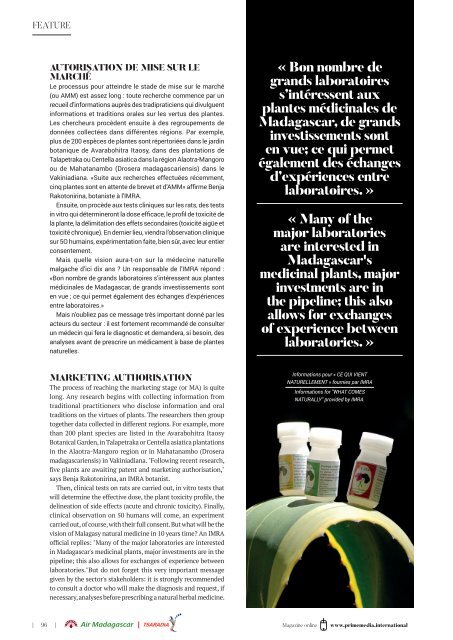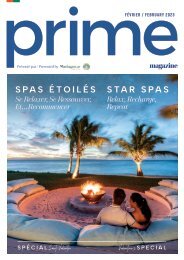Prime Magazine February 2020
Create successful ePaper yourself
Turn your PDF publications into a flip-book with our unique Google optimized e-Paper software.
FEATURE<br />
AUTORISATION DE MISE SUR LE<br />
MARCHÉ<br />
Le processus pour atteindre le stade de mise sur le marché<br />
(ou AMM) est assez long : toute recherche commence par un<br />
recueil d’informations auprès des tradipraticiens qui divulguent<br />
informations et traditions orales sur les vertus des plantes.<br />
Les chercheurs procèdent ensuite à des regroupements de<br />
données collectées dans différentes régions. Par exemple,<br />
plus de 200 espèces de plantes sont répertoriées dans le jardin<br />
botanique de Avarabohitra Itaosy, dans des plantations de<br />
Talapetraka ou Centella asiatica dans la région Alaotra-Mangoro<br />
ou de Mahatanambo (Drosera madagascariensis) dans le<br />
Vakiniadiana. «Suite aux recherches effectuées récemment,<br />
cinq plantes sont en attente de brevet et d’AMM» affirme Benja<br />
Rakotonirina, botaniste à l’IMRA.<br />
Ensuite, on procède aux tests cliniques sur les rats, des tests<br />
in vitro qui détermineront la dose efficace, le profil de toxicité de<br />
la plante, la délimitation des effets secondaires (toxicité aigüe et<br />
toxicité chronique). En dernier lieu, viendra l’observation clinique<br />
sur 5O humains, expérimentation faite, bien sûr, avec leur entier<br />
consentement.<br />
Mais quelle vision aura-t-on sur la médecine naturelle<br />
malgache d’ici dix ans ? Un responsable de l’IMRA répond :<br />
«Bon nombre de grands laboratoires s’intéressent aux plantes<br />
médicinales de Madagascar, de grands investissements sont<br />
en vue ; ce qui permet également des échanges d’expériences<br />
entre laboratoires.»<br />
Mais n’oubliez pas ce message très important donné par les<br />
acteurs du secteur : il est fortement recommandé de consulter<br />
un médecin qui fera le diagnostic et demandera, si besoin, des<br />
analyses avant de prescrire un médicament à base de plantes<br />
naturelles.<br />
« Bon nombre de<br />
grands laboratoires<br />
s’intéressent aux<br />
plantes médicinales de<br />
Madagascar, de grands<br />
investissements sont<br />
en vue; ce qui permet<br />
également des échanges<br />
d’expériences entre<br />
laboratoires. »<br />
« Many of the<br />
major laboratories<br />
are interested in<br />
Madagascar's<br />
medicinal plants, major<br />
investments are in<br />
the pipeline; this also<br />
allows for exchanges<br />
of experience between<br />
laboratories. »<br />
MARKETING AUTHORISATION<br />
The process of reaching the marketing stage (or MA) is quite<br />
long. Any research begins with collecting information from<br />
traditional practitioners who disclose information and oral<br />
traditions on the virtues of plants. The researchers then group<br />
together data collected in different regions. For example, more<br />
than 200 plant species are listed in the Avarabohitra Itaosy<br />
Botanical Garden, in Talapetraka or Centella asiatica plantations<br />
in the Alaotra-Mangoro region or in Mahatanambo (Drosera<br />
madagascariensis) in Vakiniadiana. "Following recent research,<br />
five plants are awaiting patent and marketing authorisation,"<br />
says Benja Rakotonirina, an IMRA botanist.<br />
Then, clinical tests on rats are carried out, in vitro tests that<br />
will determine the effective dose, the plant toxicity profile, the<br />
delineation of side effects (acute and chronic toxicity). Finally,<br />
clinical observation on 50 humans will come, an experiment<br />
carried out, of course, with their full consent. But what will be the<br />
vision of Malagasy natural medicine in 10 years time? An IMRA<br />
official replies: "Many of the major laboratories are interested<br />
in Madagascar's medicinal plants, major investments are in the<br />
pipeline; this also allows for exchanges of experience between<br />
laboratories.''But do not forget this very important message<br />
given by the sector's stakeholders: it is strongly recommended<br />
to consult a doctor who will make the diagnosis and request, if<br />
necessary, analyses before prescribing a natural herbal medicine.<br />
Informations pour « CE QUI VIENT<br />
NATURELLEMENT » fournies par IMRA<br />
Informations for "WHAT COMES<br />
NATURALLY" provided by IMRA.<br />
| 96 | <strong>Magazine</strong> online www.primemedia.international

















